 MyDogBreeds
MyDogBreeds Koolie is originated from Australia but Belgian Griffon is originated from Belgium. Koolie may grow 40 cm / 16 inches higher than Belgian Griffon. Koolie may weigh 18 kg / 40 pounds more than Belgian Griffon. Koolie may live 3 years more than Belgian Griffon. Koolie may have more litter size than Belgian Griffon. Koolie requires Low maintenance. But Belgian Griffon requires Moderate maintenance
Koolie is originated from Australia but Belgian Griffon is originated from Belgium. Koolie may grow 40 cm / 16 inches higher than Belgian Griffon. Koolie may weigh 18 kg / 40 pounds more than Belgian Griffon. Koolie may live 3 years more than Belgian Griffon. Koolie may have more litter size than Belgian Griffon. Koolie requires Low maintenance. But Belgian Griffon requires Moderate maintenance
 The Koolie's ancestors were both the smooth coated blue merle Collie as well as the Black and Tan Collie. The dog hails from Australia.
The Koolie's ancestors were both the smooth coated blue merle Collie as well as the Black and Tan Collie. The dog hails from Australia.
Looking much like the Heeler dog, the Koolie is thought to have got its name from German immigrants to Australia who couldn’t pronounce the name ‘collie’ properly, so the name came out as Koolie. The Koolie of today is a product of a cross between the German Koolie and the Australian Dingo.
The dog has been around for a long time and in 2000, the Koolie Club of Australia was formed. It was in 2004 that the Koolie was recognized by the Australian Sporting Registrar. In May 2006, the Stockdog Committee of the Australian Shepherd Club of America accepted the Koolie as a recognized and accepted herding breed.
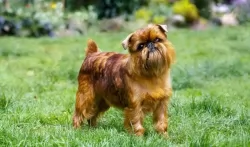 The Belgian Griffon isn’t your most attractive dog, but maybe its his quirky, gremlin looks that makes him such an adored pet for many. There are different varieties of Griffon, and the Belgian- and Brussels Griffon are one and the same. All small Belgian dogs have the same breed standards, with the Belgian having a rough coat The dog hails from Belguim and its ancestors were no doubt a mix of the Belgian street dog, the Stable Griffon and the Affenpinscher.
The Belgian Griffon isn’t your most attractive dog, but maybe its his quirky, gremlin looks that makes him such an adored pet for many. There are different varieties of Griffon, and the Belgian- and Brussels Griffon are one and the same. All small Belgian dogs have the same breed standards, with the Belgian having a rough coat The dog hails from Belguim and its ancestors were no doubt a mix of the Belgian street dog, the Stable Griffon and the Affenpinscher.
Later on in the 1800s, this combination was then crossed with the Pug, giving the dog the brachycephalic or flat faced look.
Unfortunately no written records were kept about the precise origin of this breed, but there is also the idea that the King Charles- and English Toy Spaniel were also involved in its development. These small dogs were bred to catch rats in the barns of European estates.
 Known also as the German Koolie or German Collie, the Koolie is a working- or herding dog standing at between 40 – 60cm in height and weighing up to 24kg.
Known also as the German Koolie or German Collie, the Koolie is a working- or herding dog standing at between 40 – 60cm in height and weighing up to 24kg.
The Koolie's coat is a merle coat pattern in red or black and possibly with some tan and is mostly short and smooth, though it can be medium length too. Depending on the coat color – red or black – the nose and eyes can be either brown or black, although eye color can also be blue or yellowish.
The Koolie is such a wonderful pet who has some excellent characteristics to his name. He is active, energetic, fun, clever, friendly and playful, but if you have him trained and socialized he becomes even more of a great family pet. He is intelligent too and will require an owner who is steady, firm, fair and consistent. You wouldn't call him an aggressive dog
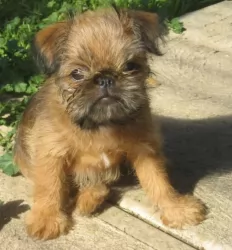 There are different variations of this dog to give it its distinctive look and size. This quaint looking little Griffon canine comes with two different coat types - soft or wiry. With the Belgian Griffon, his wiry coat of red, tan or black will need to be brushed at least twice a week. Shedding with this dog is seasonal.
There are different variations of this dog to give it its distinctive look and size. This quaint looking little Griffon canine comes with two different coat types - soft or wiry. With the Belgian Griffon, his wiry coat of red, tan or black will need to be brushed at least twice a week. Shedding with this dog is seasonal.
He has a compact, sturdy little body, and he trots around with attitude. With his sharp pointed ears and whiskers, he has been given the nickname ‘bearded dog’. His dark black eyes are alert. He is self-confident, intelligent and curious breed, a great family pet and good with children if he has grown up with them in the home. He is good with other pets. The fact that this is a small breed and that he doesn’t have excessive energy levels, means he is adaptable to city- and country living.
 Many people today like the idea of a ‘wild’ animal as a pet, and the Koolie, with his Dingo ancestry, can be a challenging dog breed to keep. People eventually blame these animals for having a poor temperament – meantime all they are essentially, are high-energy animals.
Many people today like the idea of a ‘wild’ animal as a pet, and the Koolie, with his Dingo ancestry, can be a challenging dog breed to keep. People eventually blame these animals for having a poor temperament – meantime all they are essentially, are high-energy animals.
If you keep a Koolie, it will be better if you were a firm, kind, patient, consistent dog owner who understands the special needs of these kinds of dogs. They’re an energetic, care-free animals who will do better on a large property or farm as he is lively and will need a good deal of exercise.
He is quite capable of being a splendid pet with training and socialization and will settle down well to family life when he is loved and cared for.
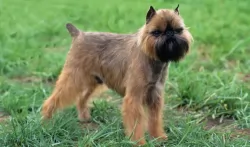 The Belgian Griffon is an affectionate pet and often establishes a strong bond with one member of the family. You’ll have your Griffon with you for about 15 years so make sure he is trained and a pleasure to have around.They are difficult to train, being somewhat stubborn so they are going to require patience. They’re sensitive too, and they won’t respond well to aggressive treatment.
The Belgian Griffon is an affectionate pet and often establishes a strong bond with one member of the family. You’ll have your Griffon with you for about 15 years so make sure he is trained and a pleasure to have around.They are difficult to train, being somewhat stubborn so they are going to require patience. They’re sensitive too, and they won’t respond well to aggressive treatment.
They’re much more indoor dogs than outdoor dogs because they’re also vulnerable to heat stroke. They just want to come indoors and be with their human family, and when you do that for them, they’ll become a wonderful friend and companion to you.
 The Koolie is a long-lived dog and there are records of it being able to reach 18 years of age. Because they have a diverse gene pool, you won’t find many genetic problems with this dog.
The Koolie is a long-lived dog and there are records of it being able to reach 18 years of age. Because they have a diverse gene pool, you won’t find many genetic problems with this dog.
It is always wise when you’re the owner of a dog, to look out for his health and wellbeing -
This is to prevent your Koolie picking up fatal diseases such as distemper and parvo-virus. Dogs can be vaccinated from 6 weeks of age for protection.
Working dogs like the Koolie are susceptible to parasites such as tapeworm. Worming of your dog can be included in your vet visit. Dogs with worms may show tell-tale signs such as being pot bellied, very pale gums, anemia and a dull, thinned coat.
A look at his droppings may reveal white segments or worms. Fleas are another kind of parasite and they breed quickly in warm months. Mange is a skin disease caused by small parasitic mites which can actually live inside the hair follicles of dogs. Veterinary treatment will be required.
This is when your pet’s temperature rises out of control. Dogs pant to reduce their body temperature so a dog puffing heavily is putting in extra work to reduce his body temperature.
Never leave you pet in a boiling hot car as the body becomes weak and he has difficulty with breathing. Without immediate treatment, the dog will collapse and die.
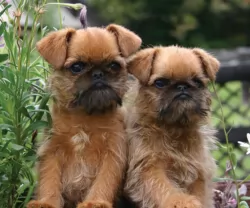 When you get your Griffon from a reputable breeder, you always have a better chance that he’ll be healthy. As it is, the Belgian Griffon has few hereditary health issues. However his dark eyes will have some genetic problems to contend with and he could suffer with progressive retinal atrophy. This is an illness which can lead to blindness
When you get your Griffon from a reputable breeder, you always have a better chance that he’ll be healthy. As it is, the Belgian Griffon has few hereditary health issues. However his dark eyes will have some genetic problems to contend with and he could suffer with progressive retinal atrophy. This is an illness which can lead to blindness
Syringomyelia – this is a neurological condition – an abnormality of the spinal cord – a disease which occurs more frequently in small breeds. It can cause your pet to endure a lot of pain.
Birthing Issues - these little dogs often have problems with giving birth, and a vet often has to intervene and perform a cesarean.
 The Koolie is an intelligent dog that will benefit from training and socialization to make him obedient and able to cope in diverse situations.
The Koolie is an intelligent dog that will benefit from training and socialization to make him obedient and able to cope in diverse situations.
These dogs show an untiring enthusiasm for exercise and work and wherever you live, you will need to ensure that he gets regular exercise.
Only the very best - both home-made and commercially manufactured food - will be good enough for this energetic dog. Good quality food ensures health and longevity. Always see that there is a constant supply of fresh, cool water.
Make sure that your dog has a warm, dry place to sleep inside and that when outside, he has a cool, sheltered spot from the sun.
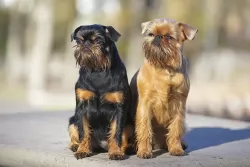 The Belgian Griffon will do well if you invest in high quality foods. You can make your own, but if you’re concerned about his health, it would be best to check what ingredients should go into his home-prepared meals to ensure he gets all the vitamins and minerals he needs.
The Belgian Griffon will do well if you invest in high quality foods. You can make your own, but if you’re concerned about his health, it would be best to check what ingredients should go into his home-prepared meals to ensure he gets all the vitamins and minerals he needs.
If you want to go with commercially manufactured dog foods, check with your vet about wet- and dry foods. Your vet will help with choosing a food appropriate to his size and age. Always ensure that there is clean, fresh water available to your pet.
Even though he is a small breed, he is fairly active and he will need his fair share of exercise like ball games and walks. Training and socialization are a must for him. You’ll notice that training isn’t particularly easy with this breed, and first time dog owners might not have the patience with him.